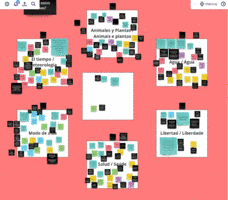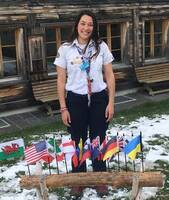Girl-Led Action on Climate Change in Latin America and the Caribbean
Across Latin America and the Caribbean, climate change presents real risks. Rising temperatures and sea levels threaten environments, economies and health. Women and girls are disproportionately affected by climate change, but are largely, and wrongly, excluded from the discourse around climate change adaptation and mitigation. This situation limits the effectiveness of countries’ climate response, now and in the future.
FAO, through the Youth and United Nations Global Alliance (YUNGA), is collaborating with World Association of Girl Guides and Girl Scouts (WAGGGS) and Girl Guiding and Girl Scouting associations across Sub-Saharan Africa, Latin America and the Caribbean to change this. Under this partnership, the Girl-led Action on Climate Change (GLACC) programme aims to ensure that girls, young women, and their families, are more resilient to climate change and lead effective mitigation and adaptation climate actions in their communities, but also that there is a gender transformative approach to climate change policy and practice, at all levels. FAO will put at the core its challenge badge action approach, in particular the YUNGA Challenge Badge on climate change, which has been empowering young people in over 100 countries to become positive drivers of change on the climate arena since 2015.
FAO organized and led a number of training workshops for 27 national girl guide association representatives from Dominica, St. Lucia, Trinidad & Tobago, Argentina, Brazil, Chile, Mexico, Nicaragua and Panama. During the training, the girls who are the future leaders of this programme in their countries, had a chance to learn more about climate change, reflect on how it is affecting their own lives and lives of communities they live in, and why as girls they experiencing these impacts much stronger than others. But most importantly, the girls realized how much actually depends on them as they discovered the plenty of ways they can make a difference and take climate action.
‘It seems essential to me that girls and young women learn from an early age, of course, with programs adapted to their branch, about the ways in which one can be an agent of change in their community regardless of their age’ – Elisa Garcia from Mexico shared her thoughts after the workshop.

- Photo credit: Mariana Urquidi and Laura Marmolejo
Another participant from Argentina, Catalina Trunzo, added: ‘Education is the basis of everything, and if girls grow up in sustainable systems and habits instilled in them, they will teach them to future generations and a day will come when everyone will follow them’.
During the workshops, girls were involved in co-creating the educational curriculum for the climate change badge. The 2 sessions provided them with opportunity to share their own experiences, select the areas of their highest interest and include the topics that are most relevant for their local context.

Girls were very enthusiastic about this participatory process in which they could contribute with their suggestions and make their voice heard. Many of them insisted that civic action in their communities and systemic change are key for fighting climate crisis. “I think it is important to teach them [young women] to always seek to improve their community, not only as individuals, but also learning to organize plans to work as a team and be able to be proactive and promote any project related to environmental awareness in their communities” – said Elisa.
FAO is providing its technical expert advice and contributions from the regional, sub-regional and country offices for developing the curriculum that is action-oriented and tailored to the local context specifics. But most importantly, FAO will help incorporate behavioural insights into the curriculum design to ensure that real shifts are happening among youth towards sustainable and climate friendly behaviours.
“We’ve seen numerous environmental education programmes have been running for decades, yet there has been no dramatic shift in human behavior. That’s why we need to shift from ‘business as usual’ education to programmes that are building on the newest insights from behavioural science to promote long-lasting behavioural changes among children and adolescents towards sustainable climate transitions”, said Reuben Sessa, FAO’s Natural Resources Officer and Innovations Deputy Team Lead.
In the next stages, the programme foresees reaching 36,000 girls to be impacted by the programme. ‘It is good that they raise awareness about climate change but that they do not just stay in the talk. We need to act! I would like them [girls and young women] to do projects to clean up the nearest coast, plogging in a forest, putting together different colored bins to separate waste. There are a thousand things that we can do to make difference’ – said Catalina.
Driven by girls opinions, the project also plans to organize at least 50 community actions and 18 advocacy campaigns. Through structured support and micro-grants, each young women will implement a grassroots project to tackle an issue of climate change in their community. In the long term, girls and young women will be better equipped to enter and occupy positions of leadership where their perspectives on climate change will be heard and respected.
In addition, 100 leaders and girls will be trained on advocacy, and 3 girls will be taken to the UN COP27. Girls and young women will gain the knowledge and skills needed to put pressure on their governments - and international institutions - to increase their commitments to and actions towards tackling climate change in a gender sensitive way. At key global events such as the UNFCC Conference of the Parties (COP) and the Commission on the Status of Women (CSW), girls and young women will also have the opportunity to share their lived experiences of climate change and influence climate action internationally.
The Results that we aim to achieve:
12,000 girls have increased knowledge, skills and the support necessary to take local action on climate change
24,000 community members benefit from increased knowledge on climate change
100 girls and young women are trained on girl-led advocacy; 3 young women represent the project by speaking at global policy events including COP
9 Girl Guiding/Scouting Associations have increased capacity to lead sustainable non formal education programmes focused on climate action
Our Goal:
Girls and young women are more resilient to climate change and lead effective mitigation and adaptation actions on climate change with a gender conscious approach at local, regional, national and international levels.
FAO is also keen to provide active support to improve monitoring and evaluation of the project. “Innovative M&E, tools and indicators will help to measure and showcase the long-term behaviour change impacts that this and other educational programmes and initiatives are having. This will eventually help national girl guide associations win the support of decision makers and attract more resources to fund and upscale future similar initiatives”, Reuben Sessa added.
Ultimately, the results of the Girl-Led Action on Climate Change project will help learn ways in which such programmes can ensure more growth and impact on young women worldwide, and will help achieve the ultimate objective of coordinating UN efforts to empower young people to have a greater role in society, raise awareness and become active agents of change to solve the climate crisis.

